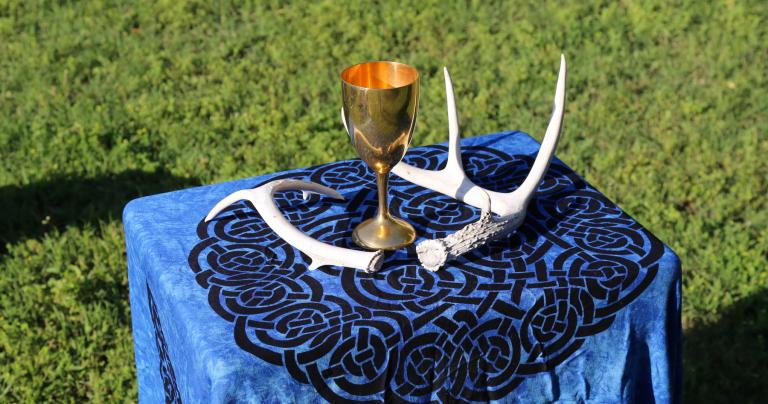Yes, I’ve been sick lately. No, not that level of sick. Just an annoying summer cold – nothing that’s likely to impact my life expectancy. But in my Nyquil-fueled haze, I’ve been wondering about the state of Paganism, and in particular, the long-term outlook for the Pagan movement.
Paganism isn’t just a hobby that makes me feel good. It’s more than an edgy alternative to Christianity or atheism. It’s my religion – it’s part of who and what I am. One of the benefits of a religion is being part of something greater than yourself, something you know will live on long after you’re gone.
Will Paganism be going strong in a hundred years? Or two hundred? Or a thousand? Or will it fade into obscurity? And most importantly, what do we need to do to insure it succeeds in the years to come?
We are still very small
There is no precise data on the number of people who consider themselves Pagans. In a 2014 Pew Research survey of the United States, 0.3% of respondents identified as “Pagan or Wiccan.” Compare that to 0.9% who identified as Muslim. More relevantly, 22% identified as “unaffiliated” – many of whom are the “spiritual but not religious.”
Paganism is not a proselytizing religion – our success is not determined by our numbers. But there is a critical mass above which continuity is certain. We have not yet reached that critical mass. This also impacts our ability to build infrastructure, a problem exacerbated by our unhealthy and unrealistic ideas around money.
We are still growing – there is plenty of reason for optimism about the future of Paganism. But we’re going to have to grow much further if we are to ever be more than a niche religion.
We are still in a speciation phase
Speciation is the biological process by which one species diverges into two or more different species by mutation and evolution. We laugh at fundamentalists who insist “I didn’t come from a monkey” – they don’t understand evolution. About 25 million years ago a common primate ancestor went through speciation. One of those new species would become monkeys, another would become humans.
During a speciation phase, the evolutionary lines split into many diverse forms. Most of those new species soon die off. But a few don’t. Those that are particularly well adapted to their environment survive and succeed and live on.
I hear some elders talk about how in the 1960s your choices were Wicca or ceremonial magic. Now there are more forms of Paganism than we can keep up with. Paganism isn’t one thing. It’s not a religion, it’s a religious movement. It includes Wicca, Druidry, Witchcraft, the many ethnic reconstructionisms, and countless more variations. And those variations get wider and wider all the time.
This is a good thing. Our ancestral religions weren’t all the same, and that’s before we get to the idea of many different Gods speaking to many different people. More importantly, it’s a sign of how Pagan religions are arising organically. They aren’t being artificially designed to appeal to the masses – they’re a response to the experiences and needs of a particular group of people in a particular place and time.
As with biological species, most of these religious species will die off before too long. But the few that are particularly well-adapted will survive and succeed.
We need depth, not unity
When I’m not hearing Pagans scream “you can’t tell me what to believe!” I hear “we need to stick together!” Yes, but…
We need to stick together where we have common interests. We need to support pan-Pagan activities like The Wild Hunt and Pagan Pride Day. We need to support religious tolerance and religious freedom for all. We need to support sustainable environmental policies.
But we don’t need to stick together on matters of theology and ritual. Let the Gardnerians be Gardnerians. Let ADF be ADF. More importantly, let the rogue witches and experimental polytheists do their things and see what happens. Some of them will fail. Some will be mediocre. But a few will discover new and better ways of being Pagan and doing Paganism. They’ll update old traditions and reinterpret them for our times. They’ll dive deeper than any of us have gone so far.
And then we’ll have a version of Paganism – or three, or nine, or nineteen – robust enough to last through the ages.
Getting from “my truth” to “more true”
One of the unpleasant realities of speciation is that most mutations are more harmful than helpful. And so most new variations quickly die off. Likewise, most new religious variants are either unhelpful, or so focused on the needs of one particular individual they aren’t useful to anyone else.
If you happen to be that one particular individual, you may not care. You’ve found what you need and you’re happy with it. So be it. Life is hard and if your set of beliefs and practices helps you live a better life, I’m happy for you.
The problem starts when people start insisting that “my truth is just as good as anybody else’s” and “deep down it’s all the same.” It isn’t.
Contrary to the insistence of hardcore Evangelicals, Catholics, and others, there is no Truth-with-a-capital-T when it comes to religion. Or at least, if there is, we can’t know it with certainty. But some things are more true than others, and other things are not true at all. We are not free to believe anything we like.
We are Pagans who pay attention. You are, or you wouldn’t bother reading this blog, and all the other stuff you read and listen to and think about. We encounter new Pagan “species” all the time. While we have an obligation to respect the religions of others (at least those that are worthy of respect – I don’t respect Christian fundamentalism and I don’t respect Pagan folkishness) we also have an obligation to examine beliefs and practices in terms of their truth and in terms of their helpfulness.
Sometimes this means we tell someone “if that’s helpful to you, fine, but it’s not true.” Other times it means we realize one of our own ideas is wrong – or less right – and so we need to change it.
“More true” Paganism will still be here when “my truth” has been long forgotten.
The future of Paganism
So, where will Paganism be in a hundred years?
I like to think we’ll eventually settle into a few general groupings centered around polytheism, traditional witchcraft, and non-theistic Nature worship. But that’s more of a wild guess than anything else. I’m primarily concerned with diving deeply into the particular variation of Pagan polytheism I practice and making it as robust as possible.
This is what I do. If it appeals to you, join me in seeing how far we can take it. If it doesn’t, there are plenty of other variations of Paganism to choose from.
But whatever you choose, I encourage you to explore it as deeply as you can go.















